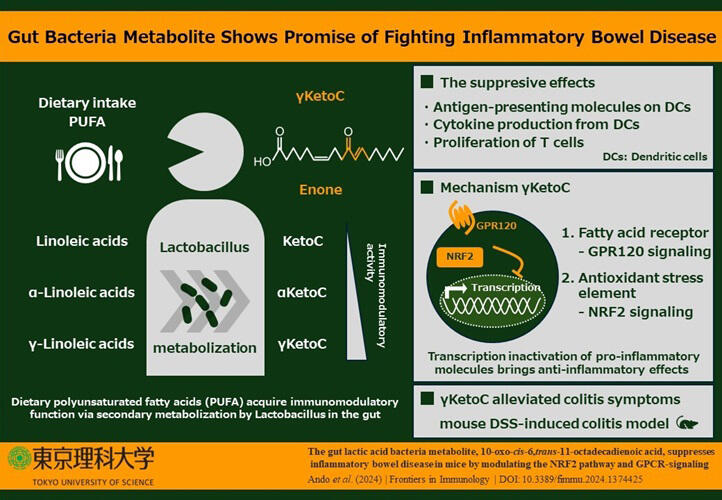A joint research group of Professor Chiharu Nishiyama and Assistant Professor Kazuki Nagata of the Department of Biological Science and Technology, Faculty of Advanced Engineering at Tokyo University of Science, in collaboration with Professor Jun Ogawa and Associate Professor Shigenobu Kishino of the Graduate School of Agriculture at Kyoto University, Professor Masayuki Yamamoto of Tohoku University Tohoku Medical Megabank Organization, and Professor Gaku Ichihara of the Faculty of Pharmaceutical Sciences at Tokyo University of Science announced that they investigated the effects of intestinal bacteria metabolites on the immune response and found that enon fatty acids, metabolites of fatty acids, suppress the inflammatory responses of dendritic cells. They also confirmed that among the enon fatty acids, γKetoC had the most potent anti-inflammatory effect compared to other metabolites. The findings are expected to contribute to developing therapeutic agents and prophylactic methods for immune-related diseases. The results were published in the international academic journal Frontiers in Immunology on April 30.

Provided by Tokyo University of Science
Various secondary metabolites are produced in the intestine by bacteria using substances derived from food components as substrates. Recent studies have shown that the enzymes found in the intestinal lactic acid bacterium L. plantarum catalyze the breakdown of fatty acids in foods. The studies have also shown that its metabolic intermediates (such as hydroxy, oxo, and enon fatty acids) have beneficial effects on the host's health, such as metabolic improvement. Meanwhile, the effects of these fatty acid metabolites on the immune response have not yet been clarified.
In a previous study published in January of this year, the research group showed that short-chain fatty acids produced from dietary fibers suppress allergic disease via mast cells. In this study, they prepared hydroxy, oxo, and enon fatty acids from polyunsaturated fatty acids (unsaturated fatty acids with two or more double bonds) using the conversion enzymes from L. plantarum and examined whether each fatty acid affected immune responses. Immune cells were prepared from mouse spleen and bone marrow, and the correlation between multiple fatty acid metabolites and immune cell activity was examined at the gene, cell, and individual levels.
The results showed that treatment with enon fatty acids (KetoC, αKetoC, and γKetoC) markedly reduced antigen-stimulation-induced cytokine secretion by immune cells prepared from mouse spleens. Among them, γKetoC showed the highest activity. Treatment with the starting materials for these metabolites, such as linoleic acid, did not inhibit cytokine secretion, suggesting that metabolic conversion imparted new functions. Furthermore, they also found that enon fatty acids strongly suppress inflammatory reactions induced by various fungal components, including lipopolysaccharide (LPS), particularly inflammatory cytokine secretion from dendritic cells.
Investigation of the mechanism by which γKetoC exerts its anti-inflammatory effects revealed that Gq-GPCRs are involved in the effects of γKetoC and its ability to activate the NRF2 pathway in dendritic cells. Oral administration of γKetoC to a mouse model of colitis mitigated the condition. The increase in the disease activity index score was alleviated, and colon atrophy due to fibrosis was also attenuated. Prolonging the administration time tended to ameliorate the weight loss, colon tissue damage, and other colitis-like findings and suppressed the increases in serum TNF-α, IL-6, and TL-12p40 concentrations.
Nishiyama said, "Our study has shown that orally ingested oil components are converted into new compounds in the intestinal tract and exert anti-inflammatory effects. We hope to further convey that intestinal bacteria make substances beneficial to our health. There are various types of edible oils, but the link between our health and oil components is commonly known for familiar examples, such as the importance of the ω3/ω6 balance and the benefits of taking docosahexaenoic acid (DHA) and eicosapentaenoic acid (EPA) as dietary supplements. On the other hand, the fatty acids determined to have high anti-inflammatory activity in our assay system do not fit into this conventional classification. In particular, γKetoC, which had the highest activity in this study, is synthesized from γ-linolenic acid by the enzymes of lactic acid bacteria. One can hypothesize that γKetoC is a real factor responsible for the effects of γ-linolenic acid against certain autoimmune diseases and allergies. Further research will reveal even more effective ways to consume the active ingredients."
Journal Information
Publication: Frontiers in Immunology
Title: The gut lactic acid bacteria metabolite, 10-oxo-cis-6,trans-11-octadecadienoic acid, suppresses inflammatory bowel disease in mice by modulating the NRF2 pathway and GPCR-signaling
DOI: 10.3389/fimmu.2024.1374425
This article has been translated by JST with permission from The Science News Ltd. (https://sci-news.co.jp/). Unauthorized reproduction of the article and photographs is prohibited.




